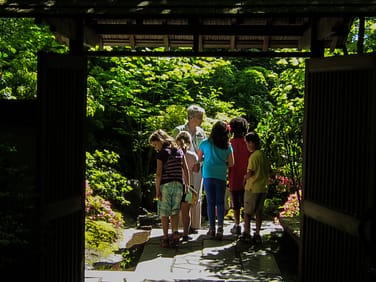Awakening the Senses
ripples in the water
seeing it from the distance
fresh air swaying
— Riley, Third Grade
This haiku was penned by Riley, a Parkrose third grader after she and her classmates visited the Portland Japanese Garden. They were part of the one-of-a-kind program called Haiku Alive that allows the Portland Japanese Garden to be a natural teacher to economically underserved children.
 Haiku Alive students are invited to immerse themselves in nature’s delights and surprises – and then to write about it. This year, the Garden happily celebrates the program’s eighth year of partnership with the Parkrose School District.
Haiku Alive students are invited to immerse themselves in nature’s delights and surprises – and then to write about it. This year, the Garden happily celebrates the program’s eighth year of partnership with the Parkrose School District.
“The educational goals thought possible at the onset of what was once a pilot project have continued to widen and deepen in meaningful ways that allow the Portland Japanese Garden to be a ‘living classroom’ which instructs everyone involved,” said Dr.
Kristin Faurest, Director of the Portland Japanese Garden Training Center which oversees the Haiku Alive program.
Retired Portland Public Schools teacher Joan Kvitka helped launch this innovative outreach program in the fall of 2011, with its initial development made possible by grants from the FAO Schwarz Family Foundation. The program continues to receive essential funding today from many philanthropic partners, including the Juan Young Trust, PGE Foundation, and individual donors. Now serving as the Garden’s Haiku Alive educational consultant, Kvitka says it’s an opportunity for students to open their eyes to a different world just outside their door. “We’re learning about living in harmony with nature. That has been my goal,” she said.
 The Portland Japanese Garden started working with Parkrose schools after a grant allowed Title 1 schools to participate in funded cultural immersion field trips. A majority of the district’s students are living at or below the standard of family poverty; over 30 languages are spoken by Parkrose families at home. “Mandated equity without widespread community support can be difficult to achieve,” says Kvitka.
The Portland Japanese Garden started working with Parkrose schools after a grant allowed Title 1 schools to participate in funded cultural immersion field trips. A majority of the district’s students are living at or below the standard of family poverty; over 30 languages are spoken by Parkrose families at home. “Mandated equity without widespread community support can be difficult to achieve,” says Kvitka.
For the past 7 years, the full immersion program of Haiku Alive has been serving one class of students in each of the four elementary schools within the Parkrose School District.
Kvitka kicks off the program each year by identifying one teacher in each of the four Parkrose elementary schools as a partner. Haiku Alive begins with a fall tour in the Portland Japanese Garden, where students learn about the Garden’s history and Japanese culture. Kvitka later visits each classroom and teaches students about Japanese values of living in harmony with nature.
“Part of that lesson is also teaching second through fifth grades to awaken their five senses in nature. Students practice the skill of capturing the four seasons with their five senses, generating an active vocabulary,” says Kvitka.
Haiku Alive and the Parkrose children are supported by a dedicated team of Garden volunteers. During a second class visit in the spring, students learn the fundamentals of writing haiku; then each class returns to the Garden carrying clipboards, pencils, and sharing digital cameras to capture Haiku in words and images. For a final classroom lesson, students write personal haiku based on their photos. The Portland Japanese Garden is excited for another year of Haiku Alive to inspire another group of Parkrose children who will discover priceless moments in nature.
“They briefly forget the problems and challenges they face and love the feeling of being outdoors and enjoying poetry,” said Jody Tucker, a teacher at Shaver Elementary School.
“All children are natural learners and the Garden is a natural teacher,” said Kvitka. “Discipline issues vanish inside the Garden, as students immerse themselves in exploration,” she added. Nature is transformative and that is evidenced in the students’ Haiku Alive Poetry.
Haiku Alive is currently seeking new volunteers to support the efforts of children in Parkrose, and we are also seeking donors to help purchase new cameras for the students.
For more information about Haiku Alive, or to donate or volunteer, please contact Catherine Adinolfi at cadinolfi@japanesegarden.org
